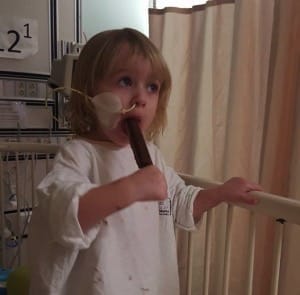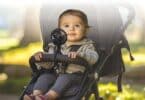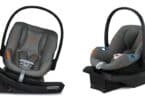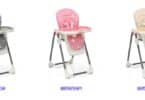Christina Smith feels relief and gratitude that her 2-year-old daughter Katie survived, but those feelings are mixed with anger. Her child was rushed to the Hospital for Sick Children in Toronto by ambulance after an x-ray showed a small mass in Katie’s chest. She underwent emergency surgery.
The first four doctors consulted about Katie sent the family home, saying the little girl had a chest cold. Her symptoms weren’t changing or improving and her mother refused to leave the last hospital until she had some answers. Because Katie’s parents were adamant, the problem was discovered and the amount of long-term damage was thankfully minimized.
Katie had swallowed a button battery.
This happens more often than people think, and we’ve written about several cases where children must endure numerous surgeries and suffer permanent damage, or even die as a result. In Katie’s case, nothing leaked out of the battery’s metal casing. She was lucky.
Her parents first noticed Katie gagging on February 8 and took her to Lakeridge Health Oshawa Hospital where a doctor listened to her chest and sent them home because it sounded clear. The following day, Katie was no better and they went to a walk-in clinic. Her airways, throat and ears were checked, but with no apparent infection, the doctor again sent the Smiths home.
The little girl couldn’t eat, kept drooling and was lethargic.
Health Canada reports that about 65 children are taken to hospitals every year after swallowing batteries. Batteries and certain types of magnets can do serious damage. They conduct a charge inside of the body which burns and can destroy the esophagus, stomach and intestines. Magnets can be attracted to each other even when swallowed, and that mass can tear up the gastrointestinal system.
Katie’s mother hopes other parents will watch for the signs and seek a second, third, fourth, or as in her case, a fifth opinion if something doesn’t seem right. Because she did, her daughter is on the mend now, eating popsicles and with limited effects from her ordeal.
Keep all loose batteries out of reach and sight of kids. Batteries should be stored like medications, if possible in a locked cabinet. Try to purchase products with battery compartments that require a tool to open. If a tool is not required, secure compartments with strong tape so little hands can’t open them. Battery buttons can be found on key fobs, mini-remotes for devices like MP3 speakers, calculators, bathroom scales, reading lights, flameless candles, talking books and greeting cards, watches, thermometers, hearing aids, flashing jewelry, ornaments, and in many games and toys.








